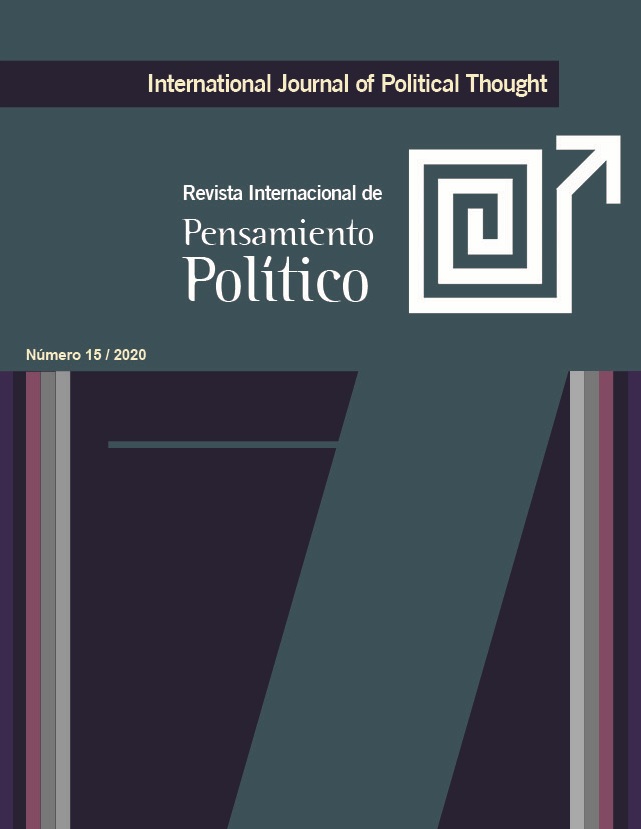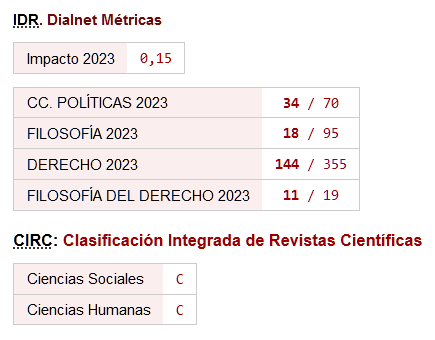Las oportunidades de la Renta Básica en América latina frente a la pandemia del COVID-19: vulnerabilidad social y bloqueos estructurales
DOI:
https://doi.org/10.46661/revintpensampolit.5593Palabras clave:
Renta básica, América Latina, protección social, COVID-19Resumen
Frente a la pandemia del COVID19, los gobiernos de América Latina han tomado medidas que tienen y tendrán un profundo impacto económico y social. Si bien muchas de estas medidas mitigan parte del costo inmedia- to de la pandemia y de las estrategias epidemiológicas para su contención, las mismas pueden terminar potenciando las vulnerabilidades de la estructura social y los déficits de los sistemas de protección social. En este escenario se observa el crecimiento del debate de propuestas como el ingreso ciudadano o renta básica. Pese a que sería deseable su implementación, no hay muchas posibilidades en el corto plazo porque la misma depende de cambios en la percepción de las elites, de la inversión para superar los déficits estructurales en la provisión de bienes públicos y de la transformación de las concepciones que sostiene a las actuales políticas de transferencias monetarias focalizadas y condicionadas.
Descargas
Citas
Arza, C. (2019). ‘Basic old age protection in Latin America: Non-contributory pensions, coverage expansion strategies and ageing patterns across countries’, Population and Development Review, Vol. 45, N° S1, pp. 23-45.
Arza, C. (2013). ‘Basic pensions in Latin America: Towards a rights-based policy?’, en Lo Vuolo, R. (Ed.), Citizen’s Income and Welfare Regimes in Latin America. From Cash Transfers to Rights. New York, Palgrave-McMillan.
Blofield, M. y Filgueira, F. (2020). COVID-19 and Latin America. Buenos Aires, Ed. Cippec.
Blofield, M, Giambruno, C. y Filgueira, F. (2020). Policy expansion in compressed time: Assessing the speed, breadth and sufficiency of post-COVID-19 social protection measures in 10 Latin American countries. Santiago de Chile, CEPAL.
Bottan, N., Hoffmann, B. y Vera-Cossio, D. (2020). Coronavirus Survey Results Show Big Impacts, Linkages between Labor Markets and Inequality. Ideas Matter Blog. Inter-American Development Bank, May 8.
CecchinI, S. y Atuesta, B. (2017). Programas de transferencias condicionadas en América Latina y el Caribe: tendencias de cobertura e inversión. Santiago de Chile, CEPAL.
CEPAL (2020a): https://www.cepal.org/es/publicaciones/45445-dimensionar-efectos-covid-19-pensar-la-reactivacion. Santiago de Chile, CEPAL.
CEPAL (2020b): El desafío social en tiempos del COVID-19. Informe Especial COVID-19, No.3. Santiago de Chile, CEPAL.
CEPAL (2018): Panorama social de América Latina, 2017. Santiago de Chile, CEPAL.
Cuesta, L., Hakovirta, M. y Jokela, M. (2018). “The antipoverty effectiveness of child support: Empirical evidence for Latin American countries”. Social Policy Administration, 52, pp. 1233–1251.
De Wispelaere, J. (2016). “Basic Income in Our Time: Improving Political Prospects Through Policy Learning?”, Journal of Social Policy, Vol. 45, 4. October, pp. 617-634.
Filgueira, F. y Lo Vuolo, R. (2020). La reducción del espacio público en América Latina. Elementos para la construcción de una contra-hegemonía en la producción de bienes y servicios sociales. Documentos de Trabajo Ciepp N° 105. Buenos Aires, Ciepp.
Filgueira, F., Galindo, L., Giambruno, C. y Blofield, M. (2020). América Latina ante la crisis del COVID-19: vulnerabilidad socioeconómica y respuesta social. Santiago de Chile, Documento CEPAL, en prensa.
FMI (2020a). https://blogs.imf.org/2020/06/26/outlook-for-latin-america-and-the-caribbean-an-intensifying-pandemic/. Washington, FMI.
FMI(2020b). https://www.imf.org/external/datamapper/NGDP_RPCH@WEO/OEMDC/ADVEC/WEOWORLD. Washington, FMI.
Lo Vuolo, R. (2015). “The limits of autonomy in Latin American social policies: promoting human capital or social control?”, European Journal of Social Theory, special issue on “Modernity and capitalism”, Casassas, D. y Wagner. P. (ed.), vol. 19, no. 2, 2015.
Lo Vuolo, R. (2013a). “Introduction”. En Lo Vuolo, R. (ed.), Citizen’s Income and Welfare Regimes in Latin America. From cash transfers to rights. New York, Palgrave-McMillan.
Lo Vuolo, R. (2013b). “Epilogue”. En Lo Vuolo, R. (ed.), Citizen’s Income and Welfare Regimes in Latin America. From cash transfers to rights. New York, Palgrave-McMillan.
Lo Vuolo, R. (2012). “Prospects and Challenges for the Basic Income Proposal in Latin America”, Basic Income Studies, Volume 7, Issue 1, June.
Rodríguez Enríquez, C. (2013). “Should Citizen’s Income Become a Goal for Feminism in Latin America?”. En Lo Vuolo, R. (ed.), Citizen’s Income and Welfare Regimes in Latin America. New York, Palgrave McMillan.
World Bank (2020): https://www.banco-mundial.org/es/publication/global-economic-prospects. Washington, World Bank.
Descargas
Publicado
Cómo citar
Número
Sección
Licencia

Esta obra está bajo una licencia internacional Creative Commons Atribución-NoComercial-CompartirIgual 4.0.
Política de acceso abierto
Se permite el acceso libre y abierto de cualquier interesado a todos los contenidos de los números de la revista, sin costo alguno, pudiendo imprimir y trasladar todos los artículos, con la única condición de precisar la fuente y la autoría.
La revista: a) no cobra a las autorías costes por el procesamiento de los artículos ni por el envío de los mismos, b) mantiene el copyright para los autores sin restricciones, c) facilita a los autores conservar sus derechos de publicación sin limitaciones.
La Revista Internacional de Pensamiento Político es una obra original del Laboratorio de Ideas y Prácticas Políticas de la Universidad Pablo de Olavide. Todos los artículos incluidos en la Revista son obra original de sus respectivas autorías. Esta Revista se ofrece libremente a la comunidad científica y académica sin coste alguno y libera los contenidos de acuerdo a la licencia "Reconocimiento-NoComercial-CompartirIgual 4.0 CC BY-NC-SA" del proyecto Creative Commons dispuesta en la siguiente url: https://creativecommons.org/licenses/by-nc-sa/4.0/legalcode
Si deseas traducir o compilar alguno de los artículos aquí disponibles, por favor, ponte en contacto













